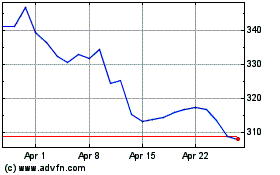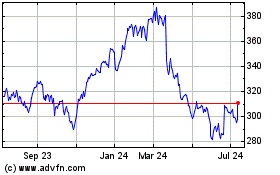Consumers Willing to Pay Extra for In-Car Technologies, Accenture Research Reveals
April 28 2016 - 12:59AM
Business Wire
Survey indicates potential stand-alone pricing,
high demand for location-based services, remote and diagnostic
services among drivers in China, Germany and the US
Drivers would opt to pay up to an additional 10 percent of a new
car’s price to get the in-car technology that they want, according
to a new survey conducted by Accenture (NYSE:ACN).
This Smart News Release features multimedia.
View the full release here:
http://www.businesswire.com/news/home/20160427006848/en/
By 2025, all new cars sold will be
connectivity enabled (Graphic: Business Wire)
The survey polled drivers in China, Germany and the United
States about their current and future use of in-car technologies,
including entertainment, information, remote and driver support
services, as well as the features they would consider paying a
premium for over the vehicle price. Accenture believes that by
2025, all new cars sold will be connectivity-enabled.
When asked what percentage of a new car’s selling price drivers
would be willing to spend on infotainment services relevant to
their needs, seven in ten of all respondents, 71 percent, would pay
up to 10 percent of the car price.
The research found that the functionalities consumers would be
most willing to spend more on include remote services like eCall,
where the vehicle automatically sends a distress message to the
nearest emergency center when a life-threatening situation occurs,
and bCall, a system which alerts a vehicle recovery organization
when a vehicle breaks down. Sixty-three percent of respondents are
interested in the e-Call feature, and 41 percent is willing to pay
for the service.
According to the survey, there is a high interest in remote
diagnostics and location-based services. Seventy-five percent are
interested in receiving vehicle health reports and 71 percent would
consider, or are very likely to start using vehicle lifecycle
management reports; with nearly half of the respondents (43
percent) willing to spend extra on these features. Over half
(55 percent) want location functionalities like stolen vehicle
tracking and recovery, navigation, and remote parked car locator
systems. A third (29 percent) would pay more for these in-car
services.
“Consumers are becoming more inclined to make separate purchases
of the in-car functions they want most, offering automakers the
opportunity to increase revenues and create after-sales
relationships with their customers – but only they can better
accommodate demand for the right functionality and services,” said
Axel Schmidt, managing director in Accenture’s automotive practice.
“We believe that the demand for a range of features, from safety
systems and remote services to parking assist technology, will
increase in the coming years.”
Future Demand
The survey reveals consumer interest in key in-car technologies
is likely to grow. For example, nearly three-quarters of the
respondents say they will very likely start using or consider using
the eCall feature in the future. In terms of future use of remote
diagnostics, 75 percent and 71 percent respectively expect to use
vehicle health and vehicle lifecycle management services. Appeal
for location-based services is also anticipated to gain popularity,
as 78 percent of respondents are interested in having the stolen
vehicle recovery and tracking system, 71 percent want features like
the remote parked car locator, and just under two-thirds, or 59
percent, would welcome the use of high-quality, in-car navigation
systems in the future.
In addition, 35 percent of drivers questioned wanted concierge
services, such as voice-activated responses to location-based
questions, with 19 percent willing to pay an additional fee for
this. Thirty-two percent want smart home integration, which
provides the ability to control automated devices within the home
from a connected vehicle, and 20 percent would pay more for it.
Twenty-eight percent indicated an interest in online service
booking, with 13 percent willing to pay a premium for the
convenience.
With regard to payments for in-car services, nearly half of
respondents (47 percent) are willing to make an upfront payment
when buying a new car, or pay for connected services over the
lifetime of the services. More than one-third of those polled (34
percent) want free basic services subject to in-car advertising
with the option to upgrade to premium versions of
services. And 32 percent would consider paying a monthly fee
for connected vehicle services using a credit card or PayPal.
The research also found:
- Vehicle Diagnostics Use – U.S.
drivers are very interested in using this technology with 63
percent of respondents indicating they are very likely to start
using it or would consider its use in the future. Respondents in
China show a strong interest in remote diagnostics (65 percent) and
remote health check (72 percent). Of the drivers polled in
Germany, 47 percent were interested in vehicle diagnostics.
- Willing to Pay More – Drivers
surveyed in China would be willing to spend an average of 16
percent of the new car’s price on infotainment features. U.S.
drivers polled would consider spending an additional 15 percent,
with drivers in Germany willing to pay 11 percent more than the
price of the car for these services. For convenience services,
drivers in the U.S. are willing to spend on average up to 16
percent of a car’s price, followed by those in China, at 15 percent
and Germany at 11 percent.
- Preferred payment methods –
Nearly half of German respondents (49 percent) would opt to pay
upfront in the car’s price for additional services, or would choose
the option of paying for connected services during the life of the
service. Forty-six percent of Chinese drivers and 45 percent
of U.S. respondents would prefer this method.
- Connected Vehicle Data Ownership
– More than half of the German respondents believe that the data
generated by connected services is owned by the provider of the
services. In contrast, a majority of U.S. and China drivers believe
that they own the data.
- Data-Sharing with Third Parties
– Seventy-five percent of German respondents say they would only
share their data if it was kept anonymous. This view is shared
by 72 percent and 71 percent of those surveyed in China and the
U.S, respectively. However, 68 percent of U.S. and Chinese
drivers would share their data if it were to improve their current
technology services, and 53 percent of German participants
agree.
“Consumer interest in spending more on desired in-car
functionality and services in three of the world’s largest
automotive markets reinforces Accenture’s belief that in-car
technologies - and the concept of the connected vehicle itself –
are defining the automotive industry, and transforming the way
consumers view the automobile,” said Schmidt. “We also believe that
the willingness of consumers to pay for in-car services separately
from a new vehicle’s purchase price will provide the industry with
new sources of revenue, further enhancing the global connected
vehicle market. We estimate that in China alone, the value of the
connected vehicle market could be as much as $216.2 billion by
2025.”
Country-Specific Findings
- Among the three markets, U.S.
respondents (71 percent) and China respondents (70 percent) show
the most interest in using connected information technologies that
would enable them to receive streaming music from their smartphone.
German respondents are not far behind, as 63 percent want the same
capability.
- US drivers, at 80 percent, are the most
interested in having a stolen vehicle recovery/tracker system.
- Forty-three percent of respondents in
both China and the US are interested in the delivery services trunk
feature, where delivery companies can access the car’s trunk or
boot, and deliver parcels. German drivers are the least interested
in this feature, at 34 percent.
- High quality navigation solutions hold
the most appeal for Chinese respondents in comparison with other
participants. China drivers mirror their U.S. counterparts in terms
of interest in a remote engine start function with 62 percent of
respondents in the two markets wanting this function.
The research questioned 5,111 respondents in China, Germany and
the United States. All respondents were over the age of 18 and
drive a car regularly, own a smartphone or plan to buy one in the
next 6-12 months.
About Accenture
Accenture is a leading global professional services company,
providing a broad range of services and solutions in strategy,
consulting, digital, technology and operations. Combining unmatched
experience and specialized skills across more than 40 industries
and all business functions – underpinned by the world’s largest
delivery network – Accenture works at the intersection of business
and technology to help clients improve their performance and create
sustainable value for their stakeholders. With approximately
373,000 people serving clients in more than 120 countries,
Accenture drives innovation to improve the way the world works and
lives. Visit us at www.accenture.com.
View source
version on businesswire.com: http://www.businesswire.com/news/home/20160427006848/en/
AccentureAnthony Hatter, + 44 7810 756
138anthony.hatter@accenture.com
Accenture (NYSE:ACN)
Historical Stock Chart
From Mar 2024 to Apr 2024

Accenture (NYSE:ACN)
Historical Stock Chart
From Apr 2023 to Apr 2024
